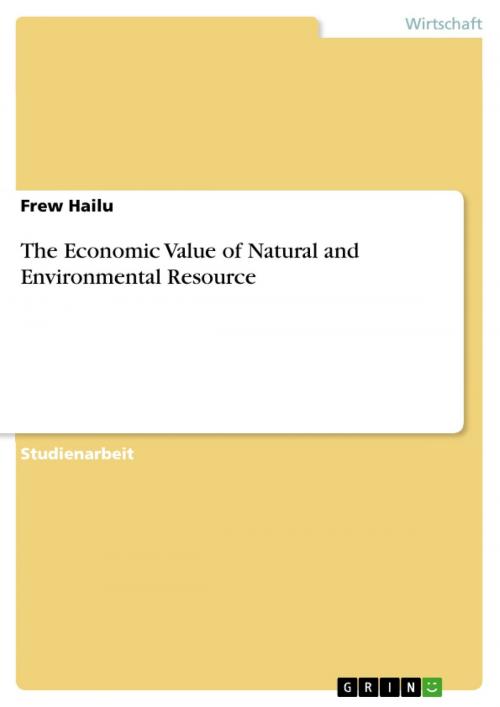The Economic Value of Natural and Environmental Resource
Business & Finance, Economics, Sustainable Development| Author: | Frew Hailu | ISBN: | 9783656834656 |
| Publisher: | GRIN Verlag | Publication: | November 10, 2014 |
| Imprint: | GRIN Verlag | Language: | German |
| Author: | Frew Hailu |
| ISBN: | 9783656834656 |
| Publisher: | GRIN Verlag |
| Publication: | November 10, 2014 |
| Imprint: | GRIN Verlag |
| Language: | German |
Studienarbeit aus dem Jahr 2013 im Fachbereich VWL - Umweltökonomie, , Veranstaltung: Environmental Economics, Sprache: Deutsch, Abstract: Monetary valuation of environmental goods has by now become the subject of numerous economic books and articles. Interest in the topic seems to be increasing in the economics profession, and theoretical insight, methodological improvements and the numbers of empirical findings are expanding rapidly. The aim of such valuation is usually to incorporate environmental concerns into a cost-benefit analysis. Another purpose is to construct environmentally adjusted national income measures Environmental value estimates have also been combined with macroeconomic models, e.g. to estimate welfare effects of a climate treaty Further, estimated willingness to pay is now accepted in the USA as a basis for legal compensation claims for damages to natural resources caused by spill of hazardous substances (Nyborg, 1996) Valuation can simply be defined 'as an attempt to put monetary values or to environmental goods and services or natural resources'. It is a key exercise in economic analysis and its results provide important information about values of environmental goods and services. This information can be used to influence decisions about wise use and conservation of forests and other ecosystems. The basic aim of valuation is to determine people's preferences by gauging how much they are willing to pay (WTP) for given benefits or certain environmental attributes e.g. keep a forest ecosystem intact. In other words, valuation also tries to gauge how much worse off they would consider themselves to be as a result of changes in the state of the environment such as degradation of a forest. Economic valuation never refers to a stock, but only the change in a stock. If one speaks of the economic value of biodiversity, then one always means the economic value of a change of biodiversity. It is not a question of determining the 'true' value of biodiversity or ecosystems but valuing changes and comparing them with their alternatives, e.g. with a golf course vs without a golf course. Thus it is non-sense to ask 'how much are the African National Parks worth?' A plausible question in this case would be: 'WWF has proposed a new policy to prevent the huge losses of wildlife species from African National Parks. What is the monetary value of the benefits of this policy (i.e., the economic damages avoided)? Economists thus stress that the valuation should focus on changes rather than levels of biodiversity or ecosystem. [...]
Studienarbeit aus dem Jahr 2013 im Fachbereich VWL - Umweltökonomie, , Veranstaltung: Environmental Economics, Sprache: Deutsch, Abstract: Monetary valuation of environmental goods has by now become the subject of numerous economic books and articles. Interest in the topic seems to be increasing in the economics profession, and theoretical insight, methodological improvements and the numbers of empirical findings are expanding rapidly. The aim of such valuation is usually to incorporate environmental concerns into a cost-benefit analysis. Another purpose is to construct environmentally adjusted national income measures Environmental value estimates have also been combined with macroeconomic models, e.g. to estimate welfare effects of a climate treaty Further, estimated willingness to pay is now accepted in the USA as a basis for legal compensation claims for damages to natural resources caused by spill of hazardous substances (Nyborg, 1996) Valuation can simply be defined 'as an attempt to put monetary values or to environmental goods and services or natural resources'. It is a key exercise in economic analysis and its results provide important information about values of environmental goods and services. This information can be used to influence decisions about wise use and conservation of forests and other ecosystems. The basic aim of valuation is to determine people's preferences by gauging how much they are willing to pay (WTP) for given benefits or certain environmental attributes e.g. keep a forest ecosystem intact. In other words, valuation also tries to gauge how much worse off they would consider themselves to be as a result of changes in the state of the environment such as degradation of a forest. Economic valuation never refers to a stock, but only the change in a stock. If one speaks of the economic value of biodiversity, then one always means the economic value of a change of biodiversity. It is not a question of determining the 'true' value of biodiversity or ecosystems but valuing changes and comparing them with their alternatives, e.g. with a golf course vs without a golf course. Thus it is non-sense to ask 'how much are the African National Parks worth?' A plausible question in this case would be: 'WWF has proposed a new policy to prevent the huge losses of wildlife species from African National Parks. What is the monetary value of the benefits of this policy (i.e., the economic damages avoided)? Economists thus stress that the valuation should focus on changes rather than levels of biodiversity or ecosystem. [...]















